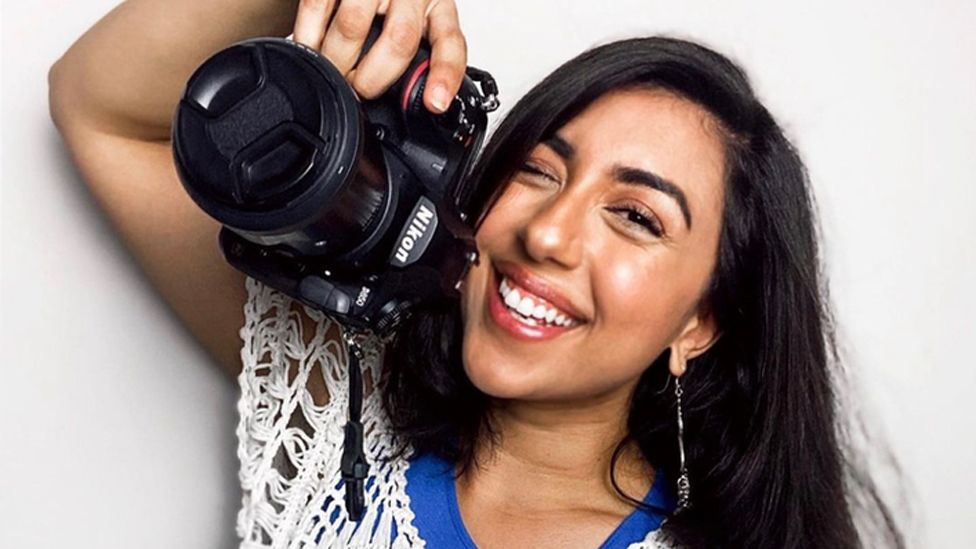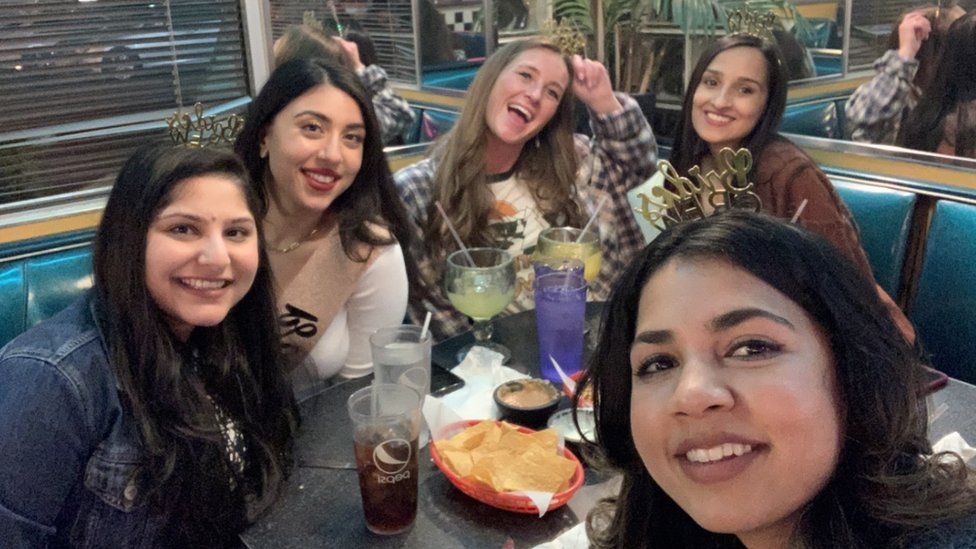When she left a bad marriage, Sania Khan said some members of her South Asian Muslim community made her feel like she had “failed at life”. Through TikTok, she found support and comfort in strangers – until her ex returned and murdered her.
This story contains details that may be upsetting to some readers.
Her bags were packed. She was ready to be free.
Instead, that day, she returned home to Tennessee in a casket.
Three days earlier, officers had found Khan unresponsive near the front door of the Chicago condominium she had once shared with her estranged husband, Raheel Ahmad, 36. She had a gunshot wound to the back of her head and was pronounced dead at the scene.
Upon arrival of the police, Ahmad had turned the gun on himself, taking his own life.
According to police reports shared with the Chicago Sun-Times, the pair were “going through a divorce”, and Ahmad, who had gone to live in a different state while separated from Khan, had travelled some 700 miles back to their former home “to salvage the marriage”.
The grisly murder-suicide was the tragic final chapter in the life of Khan, a young Pakistani-American photographer who had recently found recognition on the social-media platform TikTok as a voice for women fighting marriage trauma and divorce stigma in the South Asian community.
Her death has left her friends shaken, and has reverberated with her online followers and other South Asian women who say they have felt the pressure to stay in unhealthy relationships for the sake of appearances.
“She said 29 is going to be her year and it’s going to be a new beginning,” said BriAnna Williams, a university friend. “She was so excited.”
To her friends, Khan was a joy to be around – authentic, positive and selfless almost to a fault.
“She was someone who would give you the shirt off her back,” said Mehru Sheikh, 31, who called Khan her best friend.
“Even when she was going through some really tough times in her life, she would be the first to call you and ask you how your day is going.”
On Instagram, where she first built a public platform, she described her passion for photography with a biographic line that read: “I help people fall in love with themselves and with each other in front of the camera.”
Khan photographed weddings, maternity shoots, baby showers and other milestones, often for big-paying clients but also for many of her friends.

“Behind the camera is where she came alive,” said Ms Sheikh. “She had a knack for making people comfortable in front of the camera, for capturing raw emotion and joy.”
Meanwhile she sought the same kind of joy in her own life. After dating Ahmad for about five years, she married him in June 2021 and they moved to Chicago together.
“They had a fabulous, big, fat Pakistani wedding,”a childhood friend recalled. “But the marriage was built on a foundation of lies and manipulation.”
Khan’s friends claim Ahmad had long-standing mental health issues. The couple had been mostly in a long distance relationship before marrying, which her friends say likely obscured the extent of their incompatibility.
The problems came to a head last December when, her friend said, Khan told her that Ahmad had a mental-health crisis and she felt unsafe. The BBC was unable to reach the Ahmad family for comment.
Members of the Khan family declined, through Khan’s friends, to comment for this story.
About a dozen murder-suicides take place in the US every week, about two-thirds of which involve intimate partners, according to the Violence Policy Center.
Mental illness and relationship troubles are often identified among the top risk factors for women facing abuse by their partners. Domestic violence experts say women are most at risk of being killed by an intimate partner when they are leaving the relationship.
The December episode convinced Khan – who had until then kept details of the relationship private – to open up about her unhappy marriage, friends said.
They said Khan discussed the struggles in her marriage, telling them that her husband wasn’t sleeping and often acted strangely, that he was refusing her pleas to seek help or go to therapy, and that she felt his mental health struggles had become her burden.

But friends allege that, while they told Khan to leave the marriage, others counselled her to stay in it.
Ms Williams, 26, said her old friend broke down when they last met in Chicago in May.
“She told me that divorce was considered shameful and she was extremely lonely,” she told the BBC – recounting how Khan used the phrase “what will people say”, more commonly known in Urdu and Hindi as log kya kahenge.
Herself a child of divorce, Khan said she had witnessed first-hand the stigma some South Asian communities attach to women who leave their marriages.
“There’s a lot of cultural pressure around the impacted family and how it looks to the outside world,” said Neha Gill, executive director of Apna Ghar, a Chicago-based organisation that offers culturally sensitive services to predominantly South Asian women facing intimate partner abuse.
Many South Asian communities continue to see women as inferior and needing to be controlled, Ms Gill said, adding: “The cultures are very communal, so it’s about prioritising family or community over a person’s safety and well-being”.
But with the support of her friends, Khan filed for divorce and secured an August hearing to finalise the split.
She also filed a restraining order and changed the locks on her doors, friends said.
And she began sharing her story on TikTok, describing herself as “the black sheep” in her community.
One post reads: “Going through a divorce as a South Asian woman feels like you failed at life sometimes.”
“My family members told me if I left my husband I would be letting Shaytan [the devil in Arabic] ‘win’, that I dress like a prostitute and if I move back to my hometown they’ll kill themselves,” says another.
Another university friend, Naty, 28, who asked that her surname not be published, vividly remembers the first time Khan went viral on the platform.
“She was blowing up my phone and she said this is what I’m meant to do: To spread the word about my relationship and be a leader for women leaving their toxic marriages.”
With each post, Khan found solace and strength, even as she “received backlash” for airing out the breakdown of her marriage, according to Naty.
At the time of her death, more than 20,000 people were following Khan on TikTok.
Bisma Parvez, 35, a fellow Pakistani-American Muslim woman, was one of them.
“I remember, [after] the first video that I saw of hers, I just prayed for her,” she said.
“Women in these situations are told to have ‘sabr’ [patience in Arabic] and, in an abusive relationship, patience is not the answer.”
She lamented Khan’s death in a TikTok video of her own that has been among many shared across the platform.
The conversation has only swelled since then.
Apna Ghar, the Chicago domestic violence organisation, said it plans to hold a virtual panel discussion to commemorate Khan’s one-month death anniversary later this month.
And amid the outpouring of love from friends and followers on social media, former classmates at Khan’s high school – the Chattanooga School for Arts and Sciences – established a memorial scholarship in her name.
“Everyone’s hush-hush, but social media helps you realise what a worldwide problem this is,” said Ms Parvez.
“We’re always telling women to protect themselves, but it’s important to also raise sons who respect women. That training starts at home and each household has to make that change.”







































































